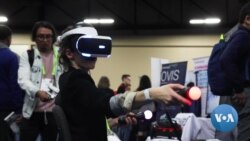Hundreds of thousands of visitors will attend the Consumer Electronics Show this week in Las Vegas, hoping to catch a glimpse of the future.
And the future, it turns out, is going to be chatty and connected. Attendees will see more voice-activated assistants, such as the Amazon Alexa speaker, but in many more gadgets, cars and appliances. And these devices will be connected, gathering data about users and offering customized services.
These new products represent a shift in the tech industry. Over the past 30 years, tech firms have focused on connecting people. Now they are connecting things, said Steve Koenig, vice president of research at the Consumer Technology Association.
The age of consumer data
“We are coming to the end of the connected age,” Koenig said. “We are fast approaching the data age of consumer technology.”
Not surprisingly, online privacy and data security will continue to be main concerns in 2019, he added.
Two of the biggest drivers of tech today are smart speakers and video doorbells with “intelligent imaging” that can identify a family member’s face versus a stranger’s, Koenig said.
Smart speakers are expected to grow 7 percent in revenue in the U.S. in 2019, according to CTA. Nearly 60 percent of U.S. consumers have used a voice assistant for the weather, according to a survey by CTA. And voice assistants will be in more devices, cars and appliances, the organization forecasts.
Smart home technologies such as video doorbells will also see sales rise by 17 percent in the U.S. in 2019.
'Resilience' products and services
New to CES this year is a “Resilience” area with exhibitors in fields such as cybersecurity, disaster preparedness, anti-terrorism and public alert systems.
“With all the natural disasters that have been happening all over the world, these are technologies that can help you either stay connected or help recover after something takes place,” said Karen Chupka, executive vice president of CES.
One example is Zero Mass Water from Arizona, which allows a person to take what looks like a solar panel and condense water vapor out of the air.
A drop in Chinese companies’ presence
Given the trade tensions between the U.S. and the Chinese government, about 1,200 Chinese companies, a 20 percent drop from last year, are exhibiting at CES, according to the South China Morning Post.
But companies from China represent up to 14 percent of the total show floor space, with some of the biggest Chinese companies such as Alibaba, Baidu and others expanding their presence, according to CTA.
One company at the center of the tensions — Chinese smartphone manufacturer Huawei — is exhibiting this year. But its CEO is not delivering a keynote address as he did last year.





